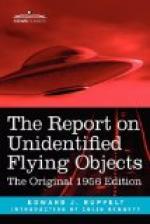This past summer at the Annual Congress of the IAF at Innsbruck, as well as previous Congresses (Zurich, 1953, Stuttgart, 1952, and London, 1951), none of the delegates representing the rocket and space flight societies of all the countries involved had strong feelings on the subject of saucers. Their attitude was essentially the same as professional members of the American Rocket Society in this country. In other words, there appear to be no confirmed saucer fans in the hierarchy of the professional societies.
I continue to follow the subject of UFO’s primarily because of my being requested for comment on the interplanetary flight aspects. My personal feelings have not changed in the past four years, although I continue to keep an objective outlook.
There are many other prominent scientists in the world whom I met while I was chief of Project Blue Book who, I’m sure, would give the same answer—they’ve not been able to find any proof, but they continue to keep an objective outlook. There are just enough big question marks sprinkled through the reports to keep their outlook objective.
I know that there are many other scientists in the world who, although they haven’t studied the Air Force’s UFO files, would limit their comment to a large laugh followed by an “It can’t be.” But “It can’t be’s” are dangerous, if for no other reason than history has proved them so.
Not more than a hundred years ago two members of the French Academy of Sciences were unseated because they supported the idea that “stones had fallen from the sky.” Other distinguished members of the French Academy examined the stones, “It can’t be—stones don’t fall from the sky,” or words to that effect. “These are common rocks that have been struck by lightning.”
Today we know that the “stones from the sky” were meteorites.
Not more than fifty years ago Dr. Simon Newcomb, a world-famous astronomer and the first American since Benjamin Franklin to be made an associate of the Institute of France, the hierarchy of the world science, said, “It can’t be.” Then he went on to explain that flight without gas bags would require the discovery of some new material or a new force in nature.
And at the same time Rear Admiral George W. Melville, then Chief Engineer for the U.S. Navy, said that attempts to fly heavier-than-air vehicles was absurd.
Just a little over ten years ago there was another “it can’t be.” Ex-President Harry S. Truman recalls in the first volume of the Truman Memoirs what Admiral William D. Leahy, then Chief of Staff to the President, had to say about the atomic bomb. “That is the biggest fool thing we have ever done,” he is quoted as saying. “The bomb will never go off, and I speak as an expert in explosives.”




